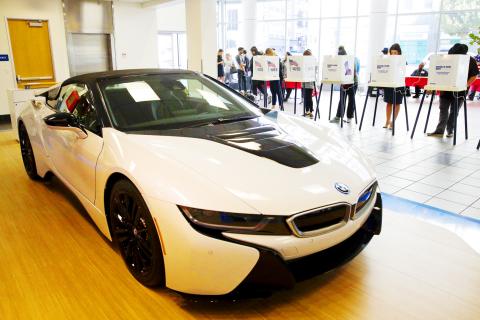German high-end carmaker BMW yesterday reported a steep drop in quarterly profit as new EU emissions tests, global trade tensions and costly recalls weighed on its bottom line.
The Munich-based group said that July-September net profit slumped 24 percent year-on-year to 1.4 billion euros (US$1.6 billion), falling short of analyst expectations.
Third-quarter revenues were up 4.7 percent to 24.7 billion euros, supported by brisk demand for the group’s vehicles, which include the compact Mini and luxury Rolls-Royce.

Photo: AP
The group had already issued a rare profit warning in September, when it was forced to lower its full-year outlook in the face of a series of setbacks.
Chief among them was the introduction of tough new EU pollution tests known as WLTP, which sent rival carmakers scrambling to shift non-compliant models before the Sept. 1 deadline.
This resulted in “unexpectedly intense competition,” BMW said.
The group has also been unnerved by US President Donald Trump’s trade row with China and his threats to slap steep tariffs on auto imports from the EU.
“The ongoing international trade conflicts had the effect of aggravating the market situation and feeding consumer uncertainty,” said BMW, which owns factories in Europe, the US and China.
The automaker also felt the pinch from a mass recall of diesel-powered cars over a fire risk in the third quarter, and increased spending on electric and self-driving cars.
“Particularly in these volatile times, we are maintaining our focus on the future and taking the decisions that will lead to tomorrow’s success,” chief executive Harald Krueger said.
BMW confirmed its trimmed outlook for this year, forecasting revenues from its car business “slightly lower” than last year, rather than the slight increase previously expected.
Group-wide profit before tax “is expected to show a moderate decrease” year-on-year, rather than staying around last year’s level of 10.7 billion euros, it said.

Nvidia Corp CEO Jensen Huang (黃仁勳) today announced that his company has selected "Beitou Shilin" in Taipei for its new Taiwan office, called Nvidia Constellation, putting an end to months of speculation. Industry sources have said that the tech giant has been eyeing the Beitou Shilin Science Park as the site of its new overseas headquarters, and speculated that the new headquarters would be built on two plots of land designated as "T17" and "T18," which span 3.89 hectares in the park. "I think it's time for us to reveal one of the largest products we've ever built," Huang said near the

China yesterday announced anti-dumping duties as high as 74.9 percent on imports of polyoxymethylene (POM) copolymers, a type of engineering plastic, from Taiwan, the US, the EU and Japan. The Chinese Ministry of Commerce’s findings conclude a probe launched in May last year, shortly after the US sharply increased tariffs on Chinese electric vehicles, computer chips and other imports. POM copolymers can partially replace metals such as copper and zinc, and have various applications, including in auto parts, electronics and medical equipment, the Chinese ministry has said. In January, it said initial investigations had determined that dumping was taking place, and implemented preliminary

Intel Corp yesterday reinforced its determination to strengthen its partnerships with Taiwan’s ecosystem partners including original-electronic-manufacturing (OEM) companies such as Hon Hai Precision Industry Co (鴻海精密) and chipmaker United Microelectronics Corp (UMC, 聯電). “Tonight marks a new beginning. We renew our new partnership with Taiwan ecosystem,” Intel new chief executive officer Tan Lip-bu (陳立武) said at a dinner with representatives from the company’s local partners, celebrating the 40th anniversary of the US chip giant’s presence in Taiwan. Tan took the reins at Intel six weeks ago aiming to reform the chipmaker and revive its past glory. This is the first time Tan

CUSTOMERS’ BURDEN: TSMC already has operations in the US and is a foundry, so any tariff increase would mostly affect US customers, not the company, the minister said Taiwanese manufacturers are “not afraid” of US tariffs, but are concerned about being affected more heavily than regional economic competitors Japan and South Korea, Minister of Economic Affairs J.W. Kuo (郭智輝) said. “Taiwan has many advantages that other countries do not have, the most notable of which is its semiconductor ecosystem,” Kuo said. The US “must rely on Taiwan” to boost its microchip manufacturing capacities, Kuo said in an interview ahead of his one-year anniversary in office tomorrow. Taiwan has submitted a position paper under Section 232 of the US Trade Expansion Act to explain the “complementary relationship” between Taiwan and the US